Covid-19: Businesses appeal for help amid new restrictions
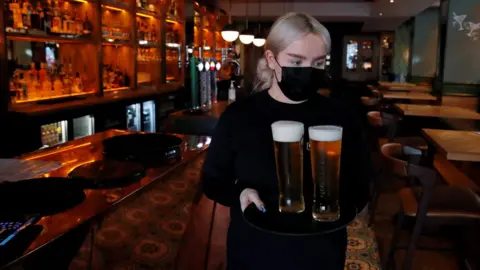 Reuters
ReutersTrade bodies have called for immediate financial help for businesses that will be affected by new Covid-19 rules coming into effect after Christmas.
Stormont ministers have decided that from 27 December hospitality venues must only offer table service and no more than six people will be allowed to sit together at a table.
Nightclubs will close from 06:00 GMT on 26 December.
But some business groups have said the rules will cost money and jobs.
Hospitality Ulster called the lack of detail around financial support "contemptible", while Belfast Chamber said it was "unforgivable".
The Stormont executive imposed restrictions in an attempt to stem the sharp rise in the number of coronavirus cases.
On Wednesday Northern Ireland recorded 3,231 new coronavirus cases, the highest daily number since the pandemic began.
It's understood that Omicron is now the dominant strain of Covid in Northern Ireland and makes up almost 60% of cases.
First Minister Paul Givan said industry representatives were right to call for support from the executive.
"We are developing a package to support nightclubs and the wider hospitality industry as well," the Democratic Unionist Party (DUP) politician told the BBC's Good Morning Ulster programme.
"We have £195m, there is work taking place with the Department of Finance, with the Department for the Economy, and both ministers spoke about this yesterday at the executive."
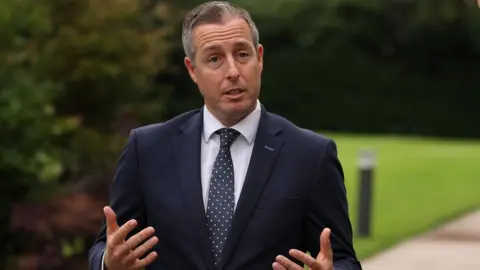 PA Media
PA MediaMr Givan said the executive was looking at what support it could provide in grants to businesses, however he added: "I readily accept that that isn't going to go far enough."
"That's why we need the UK Treasury to step up and to put in place those schemes that can directly support workers in terms of their payroll."
Mr Givan also acknowledged the pressure to workforces, including the health service, caused by periods of isolation for those who test positive.
People in England are now able to end quarantine after seven days instead of 10 by providing negative lateral flow results on day six and day seven.
"I anticipate that [isolation] will become a increasing problem, that's why England has moved from 10 days isolation to seven days," Mr Givan said.
"I think that is a place where Northern Ireland is going to have to move as well to help us address those workforce shortages."
'Christmas staff now out of work'
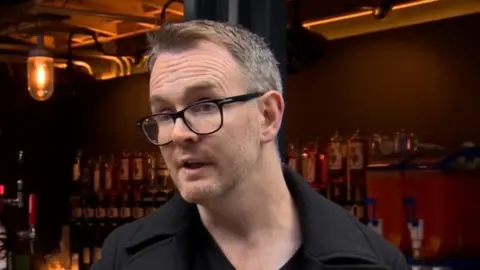
Belfast club and events promoter Joe Dougan said the nightclub industry would be hit extremely hard.
"We have about 100 staff over Christmas and they will now all be out of work," he told BBC News NI.
Mr Dougan said the closures also had a knock-on effect on those people involved in supply chains for the sector.
"I think the alternative over Christmas is that people will be mixing over unregulated settings and I think that's inevitable," he added.
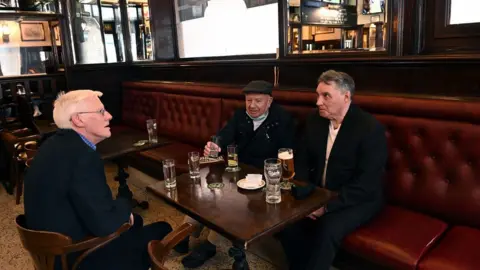 PAcemaker
PAcemaker'Unacceptable and unforgivable'
Nightclubs in Northern Ireland have only been open for seven weeks after previously being closed since March 2020.
Hospitality Ulster, which represents pubs and restaurants, said that without details of what cash would be available owners and staff would be "left worrying over Christmas".
The body's chief executive, Colin Neill, said the industry was "crying out for support".
"Business owners and staff have been left high and dry about their future over Christmas," said Mr Neill.
Janice Gault of the Northern Ireland Hotels Federation called for a better financial support system for the sector and warned that jobs and businesses were being put at risk.
"A number of people will be facing into a position now where they've had a considerable amount of cancellations making certain aspects of their business perhaps unviable.
"Other people will be sitting thinking: 'Should I go ahead? What should I do?' And this is making people increasingly nervous."
Simon Hamilton, a former Stormont minister, who is now the head of the Belfast Chamber, which represents businesses in the city, said the lack of financial help on offer was "simply unacceptable and unforgivable".
"As well as having to deal with the impact of additional measures, businesses haven't been offered a single penny in financial support," he added.
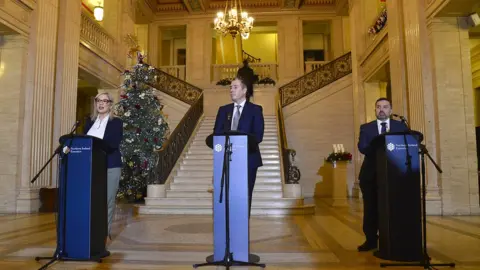 Pacemaker
PacemakerOn Wednesday, Northern Ireland Secretary Brandon Lewis tweeted criticism of the executive's decision to close businesses without providing financial support.

Allow X content?

But Mr Givan said Mr Lewis was in a position to "help the executive" by calling for the Treasury to "put in place the wage subsidy scheme".
Before the rules were announced, many hospitality businesses had already been hit by a collapse in bookings and reduced footfall due to people's fears about the spread of the Omicron variant.
Some restaurateurs took the difficult decision to close in an effort to save money.
Bob McCoubrey, owner of Mourne Seafood and The Shack, decided to close his restaurants earlier this week.
"This week in a normal year we would have done about £50,000 in business," he told BBC News NI.
"We need some urgent financial support, I saw a scheme from the UK chancellor where businesses can apply for up to £6,000, but it's based on rateable value.
"For example here, we would get £2,700 from a grant, but our wage bill every week is £7,000 so that doesn't even touch the sides."
That scheme applies to businesses in England only.
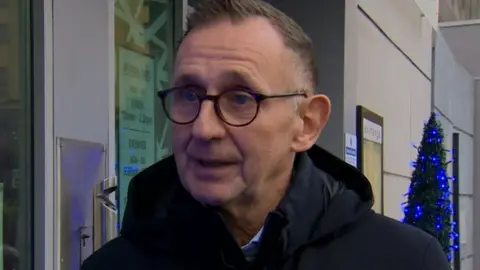
Mark Caithness, owner of The Exchange bar and restaurant in Londonderry, said public confidence had been "decimated".
"It's like death by a thousand cuts, people are just not coming out and it isn't a normal Christmas at all," he explained.
"We would usually host so many Christmas parties at this time of year, but bookings we had taken earlier in the year have essentially fallen off a cliff," he told BBC Radio Foyle.
Mr Caithness said they have already had to let staff go and that with footfall down, they were "not currently trading in a profitable way".
He fears this is "just the start" of further restrictions to come down the line.

What the NI Executive decided:
From 06:00 on 26 December:
- Nightclubs will close
- Dancing in all hospitality venues will not be allowed (does not apply to weddings or civil partnership celebrations)
- All indoor standing events will not be allowed
From 06:00 on 27 December:
- It is strongly recommended that household mixing should be reduced to a maximum of three households
- There will be a legal requirement for businesses to take reasonable measures to achieve 2m social distancing in office spaces or, where this cannot be achieved, to provide alternative mitigations
- It is strongly recommended that you should work from home where possible and where that is not possible that there should be regular workplace testing
- There will be a statutory duty on businesses to take reasonable measures to promote compliance with face coverings requirements, with a grace period until 7 January before enforcement is implemented
- The exemption of wearing a face covering where it causes severe stress will be removed and the onus of proving an exemption on medical grounds will be on the individual, with a grace period until 7 January before enforcement is implemented
- There will be a legal duty on businesses to take all reasonable steps to minimize transmission of the spread of the virus, with a grace period until 7 January before enforcement is implemented
- You will be required to be seated in all indoor hospitality settings with a maximum of six people, or 10 people from a single household, allowed at a table (children aged 12 and under are not counted and this requirement does not apply to weddings or civil partnership celebrations)
- Indoor seated and all outdoor events can proceed and it is strongly recommended that face coverings should be worn, LFD tests should be taken before attending events and there should be no multi-household travel in the same vehicle


The list of Health Trust vaccination clinics is available on Trust websites at these links.
More details of vaccinating pharmacies are available here:

